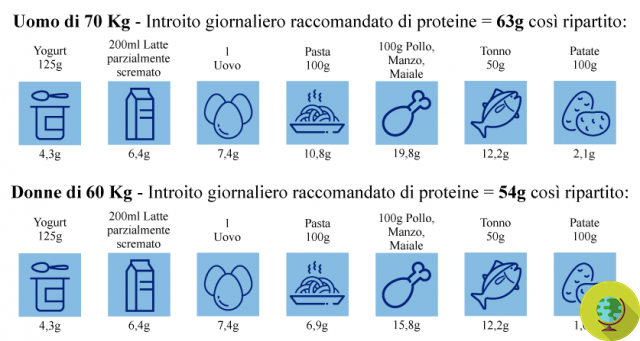
To take better care of themselves, women should never underestimate their food choices. To avoid deficiencies in important nutrients, it is good to always follow a very rich and varied diet, which includes everything that women particularly need at different times of their life, with particular attention to iron during the fertile period and to folic acid in pregnancy. Here are some useful tips for healthy nutrition for women.
Don't store avocado like this: it's dangerous
To take better care of yourself, the women they should never underestimate their food choices. To avoid shortages of important nutrients, it is good to always follow a very rich and varied diet, which includes everything that women particularly need at different times of their life, with particular attention to iron during the fertile period and folic acid during pregnancy.
Here are some useful tips for healthy nutrition for women.
Index
Iron
Iron is an essential element for the growth and development of our body. There iron deficiency It may cause fatigue, insomnia and lack of concentration. Iron stores and carries oxygen in our body. During menstruation, women face iron loss that should not be underestimated. It is therefore good that especially in the fertile period make sure you are getting enough iron. Iron is not only present in meat, but also in legumes and green leafy vegetables.
Also read: 12 sources of iron for vegans
Folic acid
Folic acid assumes a relevant importance especially during the pregnancy, but all women need it in their lifetime. For women who are expecting a baby, folic acid, also known as Vitamin B9, it is essential to maintain your health and that of your baby during pregnancy. Folic acid deficiency can cause developmental problems in the unborn baby. Food sources of folic acid include green leafy vegetables, such as spinach, and avocados.
READ also: FOLIC ACID: THE FOODS THAT CONTAIN THE MOST
Soccer
Il Calcium is vital for keeping bones and teeth strong and healthy. Calcium is important both for the health of the organism, for maintaining the figure and for reducing the symptoms of premenstrual syndrome. Calcium intake becomes important especially with advancing age, to counteract its loss. The best known sources of calcium are milk and cheese, but calcium is also present in foods such as spinach, kale, almonds and legumes.
Also read: 10 plant-based sources of calcium
Vitamin D
One of the best ways to guarantee our body a correct supply of vitamin D is given by exposure to the sun. Pregnant women should keep their levels under control at all times vitamin D, along with those of calcium, iron and folic acid. Vitamin D helps maintain mood and promote calcium absorption. Those who do not get enough exposure to the sun, due to their lifestyle, may need to take a supplement.
READ also: Vitamin D: the importance of the sun and the myths to dispel
Magnesium
Il magnesium is involved in numerous chemical reactions that take place in our body. It is an important nutrient for the nervous system, to keep the toned muscles and strong bones. Furthermore, a correct intake of magnesium would help preventOsteoporosis, a problem that mainly affects women. Additionally, magnesium helps regulate blood pressure and prevent cardiovascular disease. Sources of magnesium include pumpkin seeds, spinach, black beans and almonds.
Read also: Magnesium: the 10 best plant sources
Vitamin E
La Vitamin E it's a powerful one antioxidant, which helps prevent aging and counteract the damage caused by the action of free radicals, which are formed as a result of normal metabolism and due to exposure to pollution and cigarette smoke. Vitamin E is a key element in the eye and skin health and for the immune system. Sources of vitamin E include almonds, sunflower seeds, pine nuts, basil, hazelnuts and dried apricots.
Read also: Vitamin E: the 10 best plant sources
Omega 3
- Omega 3 they are classified among the essential elements for protecting women's health, as they protect them from numerous health problems. In fact they help reduce blood pressure and inflammation, but also to contain the risk of heart disease and cancer. Omega 3 fatty acids are present mainly in fish, with particular reference to salmon, but the intake of foods such as nuts, linseed and linseed oil is also useful.
Read anvhe: Not just fish: the 5 plant sources of Omega 3
Potassium
Il potassium plays a significant role in the transmission of nerve impulses, in normal muscle contraction and in maintaining bone health. It is also essential for the production of energia. Potassium is present in meat and fish, but also in yogurt, potatoes, bananas, spinach and broccoli, to name a few of the main sources. Foods rich in potassium help reduce the risk of high blood pressure.
Read also: Potassium: the 10 best plant sources
Vitamin C:
La Vitamin C is an important nutrient for maintaining the health of immune system. It is a powerful antioxidant that can protect cells from damage byaging. In addition, it is essential for the production of collagen, which helps keep skin and muscles healthy. Sources of vitamin C include kiwifruit, citrus fruits, strawberries, peppers and melon.
Read also: Vitamin C against colds: the foods that are richest in it
Fiber
Fibers help promote smooth movements of theintestine. Women between the ages of 19 and 50 need to take approx 25 grams of fiber per day. For women over the age of recommended daily quantity is about 21 grams. Among the best fiber sources we find fruit and vegetables, whole grains, quinoa, rice and barley. Foods rich in fiber help reduce the risk of developing the 2 type diabetes, heart problems and tumors.
Also Read: 7 Foods Surprisingly High in Fiber
Marta Albè
Read also:
5 alimony that the women they should consume more
Anemia: 10 natural remedies and cures for iron deficiency
Sage, the ally herb for women


























